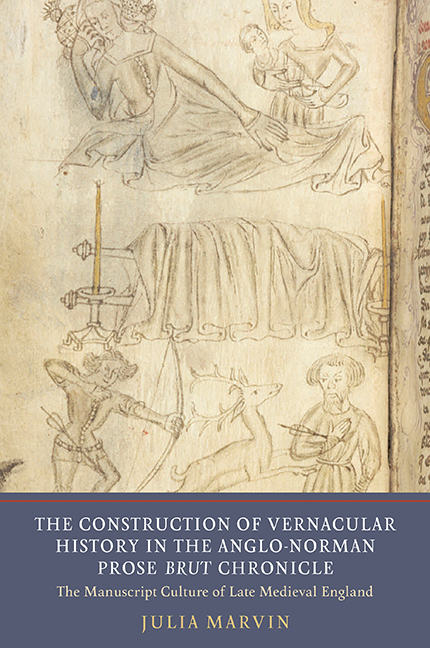 The Construction of Vernacular History in the Anglo-Norman Prose Brut Chronicle
The Construction of Vernacular History in the Anglo-Norman Prose Brut Chronicle Book contents
- Frontmatter
- Dedication
- Content
- List of Plates
- Acknowledgments
- Abbreviations
- A Note on Proper Names, Transcriptions, and Translations
- Introduction: Recognizing the Prose Brut Tradition
- Part I Construction
- 1 A New New Troy: Brut, Rome, and the Foundations of British History
- 2 The Community of the Realm: King, Baron, Brother, Stranger
- 3 Women with Voices
- 4 Social Arthur
- 5 The Continuity of the Realm
- Part II Reconstruction and Response
- Conclusion: Merlin's Power
- Bibliography
- General Index
- Index of Manuscripts Cited
2 - The Community of the Realm: King, Baron, Brother, Stranger
from Part I - Construction
Published online by Cambridge University Press: 01 February 2018
- Frontmatter
- Dedication
- Content
- List of Plates
- Acknowledgments
- Abbreviations
- A Note on Proper Names, Transcriptions, and Translations
- Introduction: Recognizing the Prose Brut Tradition
- Part I Construction
- 1 A New New Troy: Brut, Rome, and the Foundations of British History
- 2 The Community of the Realm: King, Baron, Brother, Stranger
- 3 Women with Voices
- 4 Social Arthur
- 5 The Continuity of the Realm
- Part II Reconstruction and Response
- Conclusion: Merlin's Power
- Bibliography
- General Index
- Index of Manuscripts Cited
Summary
In my analysis of its depiction of Brut and Rome, I have tried to demonstrate both how the Oldest Version works from its sources and what some of the effects of that work are, in order to articulate both its narrative techniques and the ideals that emerge from its presentation of the history of Britain. To continue throughout with the painstaking close reading of text against multiple sources entailed by that sort of analysis would be taxing on all parties concerned. I will now try to step back for a wider perspective, and to move along more quickly, while reserving the right to stop and focus on particulars from time to time.
When understood in context, even the Oldest Version's greatest departures from its sources become comprehensible as part of a program promoting the ideal of a cohesive community of the realm that extends across time and population. In this chapter, I will discuss some major concerns of the Oldest Version, considering episodes throughout the text, offering longer readings of specific incidents, and showing how it links its separate stories to create a typology of secular history.
King and Baronage
Following the model set by Brut, the prose Brut's good rulers are worthy and wise. They contribute to the general welfare by establishing laws and by building cities, roads, temples, and eventually Christian houses of religion. They respect the powerful and help the weak. They are beloved by their people. These traits recur in the brief characterizations that serve to describe obscure kings and introduce famous ones. Most frequently mentioned in these lists are good and noble rule, the love of the people, and courtesy. In the adjectival forms curtois or deboner, this word seems to have little to do with the finer things in life; instead courtesy serves as a mark of decorum towards others, an opposite to the pride evinced by the Brut's tyrants. Somewhat less frequently mentioned are marks of individual heroism, when the king is explicitly associated with knighthood and is ‘beau’, ‘vaillaunt de corps’, ‘fort’, and ‘large’ (‘handsome’, ‘powerful of body’, ‘strong’, and ‘generous’).
- Type
- Chapter
- Information
- The Construction of Vernacular History in the Anglo-Norman Prose Brut ChronicleThe Manuscript Culture of Late Medieval England, pp. 57 - 72Publisher: Boydell & BrewerPrint publication year: 2017
